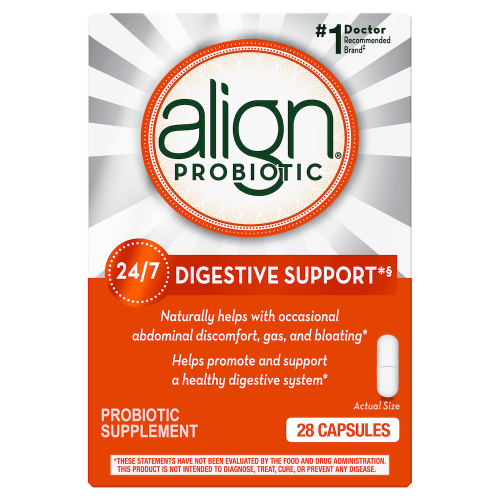After your daily coconut yogurt, your daily bloat, and your daily questioning about whether it’s time to start taking a probiotic supplement, you might be a bit confused when it comes to the world of gut health—and all of the probiotic myths that pop up any time you try to research the topic.
Just so we’re on the same page: Probiotics are good bacteria that provide a benefit and help keep your gut microbiome balanced. But when should you add them to your routine as a supplement?
“We are often dealing with stress, changes in diet, and/or [changes in] lifestyle, which can impact our digestion and gut health,” says Shana Minei Spence, RDN. “If you are noticing more of those occasional digestive or gastrointestinal tract-related issues, it’s a good idea to look into a probiotic supplement that can help support your gut microbiome.”
The microbiome, for the uninitiated, is the community of bacteria that resides in your gut and helps break down and digest the food you eat, in addition to offering other health benefits. “Adding the right good bacteria to your gut may help with those occasional digestive issues by promoting digestive balance,” says Spence, who recommends Align Probiotic® as the ideal place to start. “Align is backed by 20 years of research and contains a unique strain that specifically helps soothe symptoms such as occasional bloating, gas, and abdominal discomfort.* Many brands advertise an abundance of CFUs, but this doesn’t mean that they are going to be beneficial for your symptoms.”
In the spirit of more demystifying, we asked Spence to squash the most common probiotic myths she hears—and how to land on a probiotic that will serve your specific needs.
Scroll on to learn three probiotics myths and put those gut-health misconceptions to bed.

Align® Probiotic 24/7 Digestive Support*§
1. Myth: All your probiotic needs are met with food
Fermented foods like yogurt and kimchi have long been touted as major probiotics players. But while she’s a big fan of yogurt, Spence says that not all fermented foods actually contain probiotics—and for those that do, you’d need to eat them every day to get the benefits.“They may contain live cultures, but the cultures used to make the foods often don’t actually provide health benefits like true probiotics do,” says Spence.
Align 24/7 Digestive Support*§ has your gut health covered with its unique strain Bifidobacterium 35624™—and for bragging cred, gastroenterologists have named it the top recommended probiotic brand for the past 14 years straight‡. Even better: Whether you’re looking for gut health support on the regular or when you travel, Align doesn’t require refrigeration, unlike some other probiotics.
2. Myth: Probiotics work instantly
As a society, we’re accustomed to things moving, well, fast. Naturally, we tend to apply that mindset to health and wellness, so it’s easy to feel like giving up when a supplement doesn’t produce immediate results like we hope it will.
When introducing a probiotic supplement, Spence says it’s especially important to stick with it. “The reality is, your body needs time to adjust to the new bacteria in your gut,” she says. “Take Align daily for about a month before deciding if the healthy gut benefits are right for you.”
3. Myth: The more probiotics, the better
More is more, right? When it comes to supporting your gut, Spence says it’s actually about quality over quantity—which for probiotics is measured in colony-forming units, or CFUs. “Even if you have, say, 10 billion CFUs in a probiotic supplement, if none of those strains have been studied and shown to provide the health benefits you seek, then the amount means nothing,” says Spence.
Instead of focusing on the CFUs and number of strains, opt for a product that’s formulated by digestive health experts to address your specific symptoms. “Align not only contains a probiotic strain known to help with occasional bloating and gas, it was also developed by gastroenterologists,” says Spence.
While you should of course work within your budget, Spence says that paying for quality can be more cost effective in the long run than buying quick fixes that don’t work. “A lot of people may just opt to purchase the cheapest probiotic they can find,” Spence says. “But I’d urge against that, as not all probiotics are equal and not all probiotics deliver gut health benefits.” Consider your probiotic supplement an investment in a healthy future.
Disclaimer
*This statement has not been evaluated by the Food and Drug Administration.
This product is not intended to diagnose, treat, cure, or prevent any disease.
‡Among Gastroenterologists who recommended a brand of probiotic in ProVoice 2008-2021 surveys.
§Fortifies your digestive system with good bacteria 24/7 with continued daily use*
Top photo: Getty Images/Westend61
Sign up for the Well+Good SHOP Newsletter
Get exclusive deals on wellness, beauty, fitness, and food products that have been hand-picked by our editors.
Got it, you've been added to our email list.





